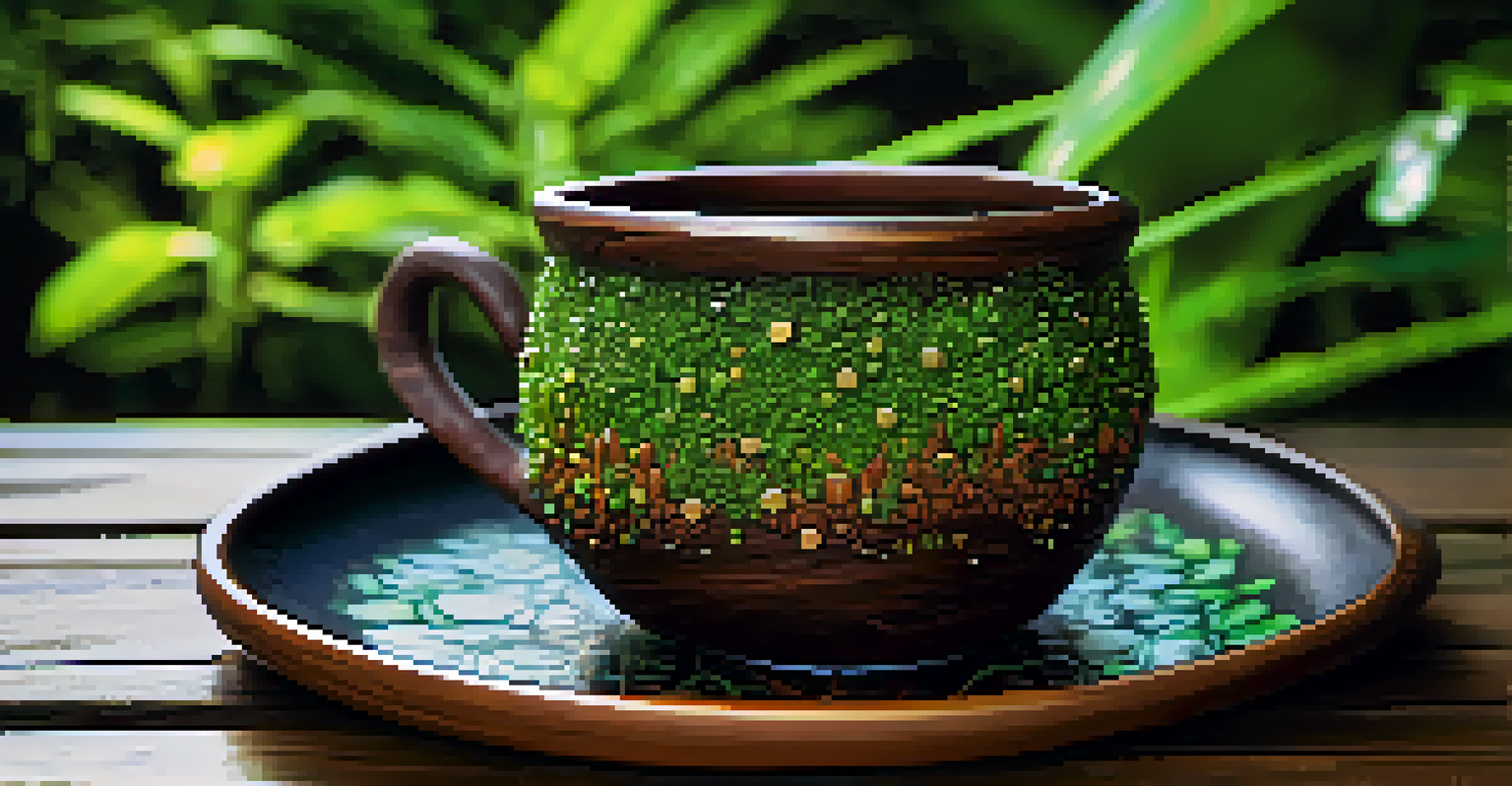Ayahuasca's Popularity: Science vs. Anecdotal Evidence

Understanding Ayahuasca: A Brief Overview
Ayahuasca is a traditional Amazonian brew known for its psychoactive properties. It's made from the Banisteriopsis caapi vine and the leaves of the Psychotria viridis plant. For centuries, indigenous tribes have used it in spiritual ceremonies, believing it connects them to the spiritual realm.
The experience of Ayahuasca is often described as a journey of self-discovery and healing, allowing individuals to confront their inner demons and emerge transformed.
Today, Ayahuasca has gained significant attention beyond its traditional roots, attracting seekers of healing and enlightenment from around the world. Its unique combination of DMT (dimethyltryptamine) and MAOIs (monoamine oxidase inhibitors) creates profound experiences that many describe as life-changing.
As more people turn to Ayahuasca for personal growth and healing, it raises questions about its efficacy and safety, leading us to explore the divide between scientific research and anecdotal evidence.
The Science Behind Ayahuasca: What Research Says
Scientific studies on Ayahuasca have started to emerge, revealing some intriguing findings. Research suggests that Ayahuasca may help alleviate symptoms of depression, anxiety, and PTSD. These studies often focus on the brew's ability to foster emotional release and introspection, which can lead to therapeutic breakthroughs.

One notable study published in 'Psychological Medicine' found that participants experienced significant reductions in depression and anxiety after Ayahuasca ceremonies. The active compounds in Ayahuasca appear to facilitate neuroplasticity, which is the brain's ability to reorganize itself, allowing for new perspectives and healing.
Ayahuasca's Healing Potential
Research suggests that Ayahuasca may alleviate symptoms of depression, anxiety, and PTSD through its unique psychoactive compounds.
While the science is promising, it's essential to approach these findings with caution. The complexity of individual experiences means that Ayahuasca's effects can vary widely from person to person.
Anecdotal Evidence: Personal Stories and Experiences
Anecdotal evidence surrounding Ayahuasca is abundant, with countless individuals sharing transformative stories. Many report profound spiritual awakenings, emotional healing, and even physical benefits after participating in Ayahuasca ceremonies. These personal narratives often highlight themes of self-discovery and connection to something greater.
Ayahuasca is not just a medicine; it’s a powerful tool for personal growth and understanding, bridging the gap between science and spirituality.
For instance, a participant might describe a journey where they confront past traumas, leading to a newfound sense of peace. Such stories resonate deeply with those seeking alternative healing methods or a deeper understanding of themselves.
However, while these accounts are powerful, they are subjective and cannot replace rigorous scientific inquiry. The emotional weight of these experiences makes it crucial to consider both personal testimonies and scientific research in the broader conversation about Ayahuasca.
The Cultural Context of Ayahuasca Use
Understanding Ayahuasca's popularity also requires a look at its cultural context. In Amazonian traditions, Ayahuasca is more than just a drink; it's a sacred tool for healing and spiritual insight, often administered by trained shamans. This cultural backdrop emphasizes the communal and ritualistic aspects of Ayahuasca ceremonies, setting them apart from recreational drug use.
As Westerners increasingly participate in these ceremonies, questions arise about cultural appropriation and the preservation of indigenous practices. It's vital to approach Ayahuasca with respect for its origins and the communities that have safeguarded its use for generations.
Cultural Significance Matters
Ayahuasca is a sacred tool in Amazonian traditions, emphasizing the importance of respecting its cultural origins in modern ceremonies.
This cultural lens adds depth to the discussion of Ayahuasca, reminding us that its growing popularity is not just about individual experiences but also about the stories and traditions that shape its significance.
Risks and Considerations of Ayahuasca Use
While many people rave about their Ayahuasca experiences, it's essential to acknowledge the risks involved. The brew can lead to intense psychological reactions, and not everyone is suited for this kind of journey. Individuals with certain mental health conditions, such as schizophrenia or bipolar disorder, may experience exacerbated symptoms.
Additionally, the physical effects of Ayahuasca can include nausea, vomiting, and diarrhea, which are considered part of the purging process but can be distressing. It's crucial for participants to be well-informed and to approach these ceremonies with caution.
Seeking out reputable facilitators and understanding the potential risks can help mitigate some of these concerns. Awareness and preparation are key to ensuring a safe and meaningful experience.
The Intersection of Science and Anecdote
The conversation around Ayahuasca often finds itself at the intersection of science and anecdotal evidence. While scientific research provides valuable insights into its therapeutic potential, personal stories offer a rich tapestry of human experience that numbers alone cannot capture. Each perspective contributes to our understanding of Ayahuasca's impact.
For example, while studies may show a statistical reduction in anxiety, individual stories highlight the deep emotional transformations that occur during ceremonies. Both science and anecdote serve to validate the experiences of those who turn to Ayahuasca for healing.
Risks Should Not Be Overlooked
Intense psychological reactions and physical side effects highlight the need for caution and informed participation in Ayahuasca ceremonies.
This interplay invites us to appreciate the nuances of Ayahuasca's popularity. By valuing both evidence-based research and personal narratives, we can form a more comprehensive understanding of its effects.
Navigating the Future of Ayahuasca Research
As interest in Ayahuasca continues to grow, the future of research in this field looks promising. Scientists are increasingly recognizing the need for rigorous studies that explore not only the biochemical effects of Ayahuasca but also the social and cultural dimensions of its use. This holistic approach can provide deeper insights into the brew's complexities.
Moreover, as legal frameworks around psychedelics begin to shift, more opportunities for controlled studies may arise. This could lead to a clearer understanding of who benefits most from Ayahuasca and under what circumstances.

Ultimately, the evolving landscape of Ayahuasca research offers hope for those seeking to understand its profound effects. As we continue to explore the science and stories, we may uncover new pathways for healing and connection.